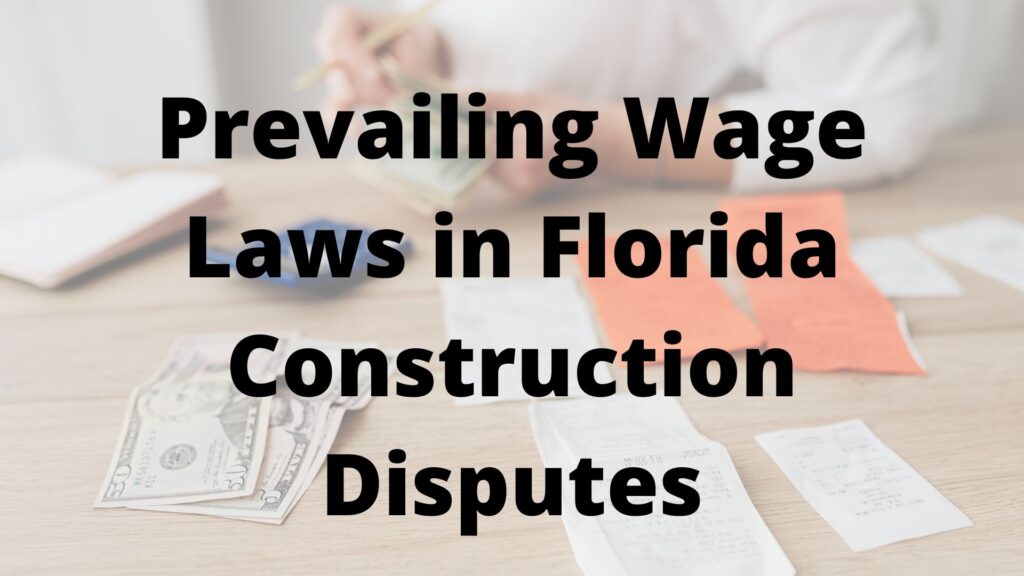
Florida, known for its booming construction industry, operates with a unique approach to prevailing wage laws. Unlike many other states, Florida does not have a statewide prevailing wage law that mandates specific wage rates for workers on public construction projects. This absence, however, doesn’t mean prevailing wages are entirely irrelevant, especially when disputes arise in construction litigation and arbitration.
Understanding Florida’s Landscape
In essence, Florida’s construction market is largely governed by market forces. Contractors and subcontractors negotiate wages based on supply and demand, skill levels, and project complexities. This contrasts sharply with states that enforce prevailing wage laws, which typically set minimum wage rates based on local area wage determinations.
However, certain exceptions and nuances exist:
- Federal Projects: When federal funding is involved in a Florida construction project, the federal Davis-Bacon Act comes into play. This act mandates that contractors pay prevailing wages, as determined by the U.S. Department of Labor, to workers on federally funded or assisted projects exceeding $2,000.
- Local Ordinances: Some Florida counties or municipalities may have their own local ordinances that establish prevailing wage requirements for projects within their jurisdictions. These ordinances are less common but can significantly impact project costs and labor relations.
- Contractual Agreements: Even without statutory mandates, parties involved in construction projects can voluntarily agree to prevailing wage rates through contractual agreements. This is where the silent player starts to make its presence felt during dispute resolution.
Prevailing Wage in Construction Litigation and Arbitration
When construction disputes escalate to litigation or arbitration, the absence or presence of prevailing wage considerations can become crucial:
- Breach of Contract: If a contract stipulates prevailing wage rates, and a party fails to adhere to those rates, it can lead to a breach of contract claim. Disputes may arise regarding the interpretation of the prevailing wage clause, the accuracy of wage calculations, or the scope of work covered.
- Labor Disputes: Disputes involving labor costs, wage discrepancies, or alleged underpayment can be complicated by the lack of clear statutory guidelines. Arbitrators or judges must rely heavily on contractual language, industry standards, and expert testimony to determine fair compensation.
- Change Orders and Delays: Changes in project scope or delays can significantly impact labor costs. When prevailing wage rates are involved, disputes may arise regarding the proper calculation of additional labor costs due to these changes or delays.
- Expert Testimony: Construction litigation and arbitration frequently involve expert witnesses, including labor economists or construction cost consultants. These experts can provide valuable insights into prevailing wage rates, industry standards, and the impact of wage variations on project costs.
- Federal vs. State: The distinction between state and federal projects becomes very important. If a project crosses the line between state and federal oversight, it can drastically change the legal landscape of the dispute.
Resources:
- S. Department of Labor, Davis-Bacon Act: This website provides information on federal prevailing wage requirements. https://www.dol.gov/agencies/whd/government-contracts/construction
- Florida Statutes: Access the full text of Florida’s state laws, including those related to construction contracts. http://www.leg.state.fl.us/statutes/
- Local County and City websites: For information on local ordinances, it is best to check the specific county or city’s official government website.
- American Arbitration Association (AAA): For information regarding construction arbitration rules and procedures. https://www.adr.org/
- Florida Bar Association: For legal resources and information related to Florida construction law. https://www.floridabar.org/
 John Caravella Esq., is a construction attorney and formerly practicing project architect at The Law Office of John Caravella, P.C., representing architects, engineers, contractors, subcontractors, and owners in all phases of contract preparation, litigation, and arbitration across New York and Florida. He also serves as an arbitrator to the American Arbitration Association Construction Industry Panel. Mr. Caravella can be reached by email: [email protected] or (631) 608-1346.
John Caravella Esq., is a construction attorney and formerly practicing project architect at The Law Office of John Caravella, P.C., representing architects, engineers, contractors, subcontractors, and owners in all phases of contract preparation, litigation, and arbitration across New York and Florida. He also serves as an arbitrator to the American Arbitration Association Construction Industry Panel. Mr. Caravella can be reached by email: [email protected] or (631) 608-1346.
The information provided on this website does not, and is not intended to, constitute legal advice; instead, all information, content, and materials available on this site are for general informational purposes only. Readers of this website should contact their attorney to obtain advice with respect to any particular legal matter. No reader, user, or browser of this site should act or refrain from acting on the basis of information on this site without first seeking legal advice from counsel in the relevant jurisdiction. Only your individual attorney can provide assurances that the information contained herein – and your interpretation of it – is applicable or appropriate to your particular situation. Use of, and access to, this website or any of the links or resources contained within the site do not create an attorney-client relationship between the reader, user, or browser and website authors, contributors, contributing law firms, or committee members and their respective employers.
